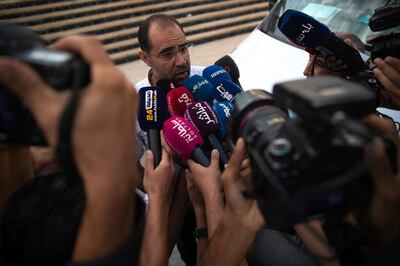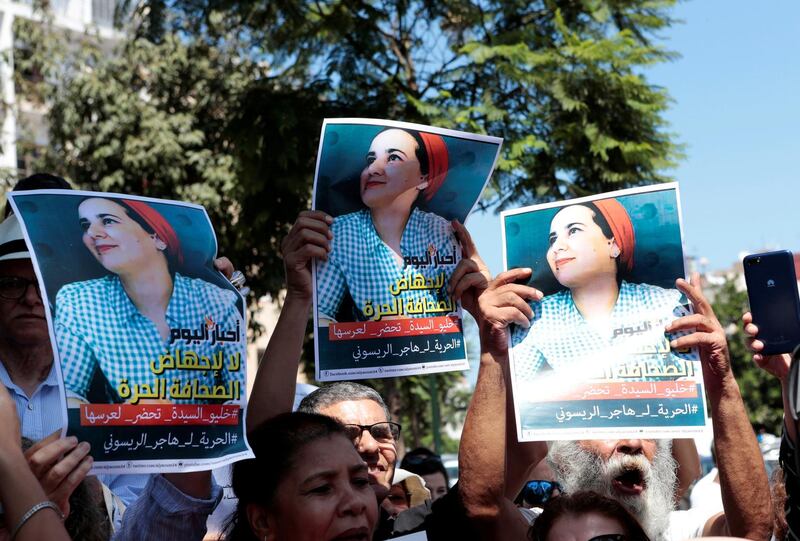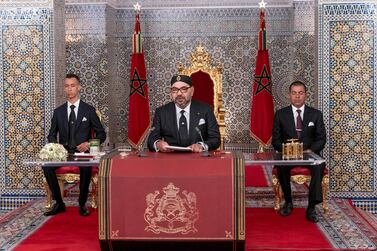A Moroccan journalist was jailed Monday for an "illegal abortion" and sexual relations outside marriage, sparking outrage from human rights groups in the country who say the one-year prison term is politically motivated because of her work.
Hajar Raissouni, who writes for Akhbar Al-Yaoum - an Arabic-language newspaper which has criticised the state - denied the charges, saying she was treated for internal bleeding. Her gynaecologist, Dr Mohammed Jamal Belkeziz, also testified to this effect at the trial in Rabat.
"This trial had no foundation - the accusations were baseless," said Abdelmoula El Marouri, a defence lawyer for Ms Raissouni, after the verdict.
Ms Raissouni and her fiance were arrested on August 31 as they were leaving a gynaecologist's clinic in Rabat.
She was sentenced on Monday under Article 490 of the legal code of the kingdom, which punishes sexual relations out of wedlock, while the law also forbids all abortions unless the mother's life is in danger.
The court also sentenced Ms Raissounni’s fiance to a year in prison and her gynaecologist to two years in prison. A nurse and doctor’s assistant were handed suspended sentences.
"We are shocked by this verdict," Mr El Marouri told Reuters, saying that all the medical and legal evidence should have led to an acquittal.
He said Ms Raissouni's prosecution had been a politically motivated attack on her, her family and her newspaper, and that the verdict would be appealed.
Ms Raissouni and her fiance told the court they had married in a religious ceremony and were preparing documents to register their marriage in law.
Trialwatch, a section of actor George Clooney’s Foundation For Justice, said the evidence the prosecution brought “did not sustain the charges”.
“The defence asserted that blood tests revealed that the levels of pregnancy hormone in the defendant’s blood were so low that it would have been impossible for her to be eight weeks pregnant as the police’s doctor claimed.”
Rights groups said her trial was part of a crackdown on critical reporters. Another journalist, Hamid El Mahdaoui, who covered protests in the Rif region, was sentenced last April to three years in jail for not reporting a crime against state security.
Ms Raissouni's uncle, Ahmed Raissouni, is a former leader of the Movement for Unity and Reform, an Islamist group close to the Justice and Development party (PJD) that leads Morocco’s governing coalition.

Another uncle, Souliman Raissouni, is editor-in-chief of Akhbar Al Youm and a vocal critic of the state. He said Ms Raissouni had been "singled out" and accused the state of trying to settle scores with his family and his newspaper. Ms Raissouni said she had been quizzed by authorities about Souliman Raissouni.
Morocco currently ranks 135th out of 180 countries on the Press Freedom Index. Reporters Without Borders, which issues the index annually, said Ms Raissouni's treatment amounted to "meddling in the private lives of journalists and the use of personal information" with the intent of defamation.
Amnesty International described the sentence as a "devastating blow for women's rights in Morocco".
Instead of "publicly slandering Hajar Raissouni... and convicting her on unjust charges, Morocco's authorities should revoke her conviction and order her immediate and unconditional release" and all others convicted in the case, said Heba Morayef, Amnesty's Middle East and North Africa director.






